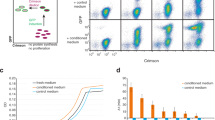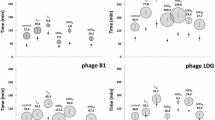Abstract
The effect of a sharp temperature rise (30° to 42°C) on the rate of peptide synthesis inLegionella pneumophila (three strains),Tatlockia micdadei (Tatlock), andFluoribacter bozemanae (WIGA) was examined. Most striking was an increase in the rate of synthesis of 4–5 peptides of approximate molecular weight 85,000 daltons (85k), 78k, 70k, and either 60k (only in theL. pneumophila strains and WIGA) or 62.5k, and 40k (only in Tatlock). The response required new mRNA synthesis. In addition, the heat shock response of these organisms continued as long as the high temperature condition persisted (at least 24 h) and for at least 1 h after temperature downshift (to 30°C).
Similar content being viewed by others
Literature Cited
Ashburner M, Bonner JJ (1979) The induction of gene activity in Drosophila by heat shock. Cell 17:241–254
Bardwell JCA, Craig EA (1984) Major heat shock gene of Drosophila and theEscherichia coli heat-induciblednaK gene are homologous. Proc Natl Acad Sci USA 81:848–852
Best M, Stout J, Muder RR, Yu VL, Goetz A, Taylor F (1983) Legionellaceae in the hospital water-supply. Lancet 2:307–310
Borbely G, Suranyi G, Korcz A, Palfi Z (1985) Effect of heat shock on protein synthesis in theCyanobacterium synechococcus p. strain PCC 6301. J Bacteriol 161:1125–1130
Fliermans CB, Cherry WB, Orrison LH, Smith SJ, Tison DL, Pope DH (1981) Ecological distribution ofLegionella pneumophila. Appl Environ Microbiol 41:9–16
Georgopoulos C, Tilly K, Drahos D, Hendrix R (1982) The B66.0 protein ofEscherichia coli is the product of thednaK gene. J Bacteriol 149:1175–1177
Guttman SD, Glover CVC, Allis CD, Gorovsky MA (1980) Heat shock, deciliation and release from anoxia induce the synthesis of the same set of polypeptides in starvedT. pyriformis. Cell 22:299–307
Gwynne DI, Brandhorst BP (1982) Alterations in gene expression during heat shock ofAchyla ambisexualis. J Bacteriol 149:488–493
Hall BG (1983) Yeast thermotolerance does not require protein synthesis. J Bacteriol 156:1363–1365
Kelley PM, Schlesinger MJ (1978) The effect of amino acid analogues and heat shock on gene expression in chicken embryo fibroblasts. Cell 15:1277–1286
Lee PC, Bochner BR, Ames BN (1983) AppppA, heat-shock, and cell oxidation. Proc Natl Acad Sci USA 80:7496–7500
Lema M, Brown A (1983) Electrophoretic characterization of soluble protein extracts ofLegionella pneumophila and other members of the family Legionellaceae. J Clin Microbiol 17:1132–1140
Lemaux PG, Herendeen SL, Block PL, Neidhardt FC (1978) Transient rates of synthesis of individual polypeptides inE. coli following temperature shift. Cell 13:427–434
Li GC, Werb Z (1982) Correlation between synthesis of heat shock proteins and development of thermotolerance in Chinese hamster ovary cells. Proc Natl Acad Sci USA 79:3218–3272
McAlister L, Finkelstein DB (1980) Heat shock proteins and thermal resistance in yeast. Biochem Biophys Res Commun 93:819–924
Miller MJ, Xuong HH, Geiduschek EP (1979) A response of protein synthesis to temperature shift in the yeastSaccharomyces cervisiae. Proc Natl Acad Sci USA 76:5222–5225
Minton KW, Karmin P, Hahn GM, Minton AP (1982) Non-specific stabilizations of stress susceptible proteins by stress resistant proteins: a model for the biological role of heat shock proteins. Proc Natl Acad Sci USA 79:7107–7111
Mitchell H, Moller G, Peterson N, Lipps-Sarmients L (1979) Specific protection from phenocopy induction by heat shock. Dev Genet 1:181–192
Neidhardt FC, Phillips TA, Van Bogelen RA, Smith MW, Georgalis Y, Subramanian AR (1981) Identity of the B56.5 protein, the A-protein, and thegroE gene product of theEscherichia coli. J Bacteriol 145:513–520
Neidhardt FC, Van Bogelen RA (1981) Positive regulatory gene for temperature-controlled proteins inEscherichia coli. Biochem Biophys Res Commun 100:894–900
Neidhardt FC, Van Bogelen RA, Lau ET (1983) Molecular cloning and expression of a gene that controls the high-temperature regulation ofEscherichia coli. J Bacteriol 153:597–603
Plouffe JF, Webster LR, Hackman B (1983) Relationship between colonization of hospital buildings withLegionella pneumophila and hot water temperatures. Appl Environ Microbiol 46:769–770
Schofield GM, Wright AE (1984) Survival ofLegionella pneumophila in a model hot water distribution system. J Gen Microbiol 130:1751–1756
Stout J, Yu VL, Vickers RM, Zuravleff J, Best M, Brown A, Yee RB, Wadowsky R (1982) Ubiquitousness ofLegionella pneumophila in the water supply of a hospital with endemic Legionnaires' Disease. N Engl J Med 306:466–468
Tilly K, McKittrick N, Zglieg M, Georgopoulos C (1983) The dnaK protein modulates the heat shock response ofE. coli. Cell 34:541–546
Tissieres A, Mitchell HK, Tracy V (1974), Protein synthesis in salivary glands ofDrosophila melanogaster: relation to chromosome puffs. J Mol Biol 84:389–398
Wadowsky RM, Yee RB, Mezmar L, Wing EJ, Dowling JN (1982) Hot water systems as sources ofLegionella pneumophila in hospital and nonhospital plumbing fixtures. Appl Environ Microbiol 43:1104–1110
Walsh C (1980) Appearance of heat shock proteins during the induction of multiple flagella inNaegleria gruberi. J Biol Chem 255:2629–2632
Wang C, Gomer RH, Lazarides E (1981) Heat shock proteins are methylated in avian and mammalian cells. Proc Natl Acad Sci USA 78:3531–3535
Yamamori T, Ito K, Nakamura Y, Yura T (1978) Transient regulation of protein synthesis inE. coli upon shift-up of temperature. J Bacteriol 134:1133–1144
Yamamori T, Yura T (1980) Temperature induced synthesis of specific proteins inEscherichia coli: evidence for transcriptional control. J Bacteriol 142:843–851
Yamamori T, Yura T (1982) Genetic control of heat-shock protein synthesis and its bearing on growth and thermal resistance inEscherichia coli. Proc Natl Acad Sci USA 79:860–864
Yee RB, Wadowsky RM (1982) Multiplication ofLegionella pneumophila in unsterilized tap water. Appl Environ Microbiol 43:1330–1334
Yu VL, Best M, Stout J, Brown A, Goetz A (1982) Effectiveness of intermittent short term elevations of the hospital water supply in controlling nosocomial Legionnaires' disease [abstr L 19]. Presented at the 82nd meeting of the American Society for Microbiology, Atlanta, 7–12 March 1982
Author information
Authors and Affiliations
Rights and permissions
About this article
Cite this article
Lema, M.W., Brown, A. & Chen, G.C.C. Altered rate of synthesis of specific peptides in the legionellae in response to growth temperature. Current Microbiology 12, 347–352 (1985). https://doi.org/10.1007/BF01567895
Issue Date:
DOI: https://doi.org/10.1007/BF01567895




